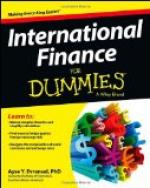On the other side of the account there are plenty of good reasons against the business. In the first place the terms offered are so onerous to the borrower that it may safely be said that no respectable issuing house in London would look at them. In effect the Republic would be paying nearly 6 per cent, on the money, if it sold its 5 per cent. bonds at 85, and the state of its credit, as expressed by the price of its bonds in the market, would not justify such a rate. The profit offered to the issuing house is too big, and the commission demanded by the intermediary is so large that it plainly points to evil practices in Barataria. It means that interested parties have made underhand arrangements with the Finance Minister, and that the Republic is going to be plundered, not in the fine full-flavoured style that ruled in earlier generations, but to an extent that makes the business too disreputable to handle. Any honourable English house would consider that the terms offered to itself and the conditions proposed by the emissary were such that the operation was suspicious, and that being mixed up with suspicious business was a luxury that it preferred to leave alone.
On other grounds the loan, well secured as it seems to be, is not of a kind to be encouraged. We have supposed its purpose to be, firstly, to meet a deficit in a Budget, and secondly, to pay for naval expansion. Neither of these objects is going to improve the financial position of the Republic. Covering a deficit by loan is bad finance in any case, but especially so when the loan is raised abroad. In the latter case it is most likely that the borrowing State is outrunning the constable, by importing more goods than it can pay for out of current production.
If it imports for the purpose of increasing its productive power by buying such things as railway material, then it is making a perfectly legitimate use of its credit, as long as the money is well spent, and the railways are honestly built, with a prospect of opening up good country, and are not put into the wrong place for political or other reasons. But if this were so, the money would not be wanted to balance a Budget, but on railway capital account. When a balance has to be filled by borrowing it can only mean that the State has spent more than its revenue from taxes permits, and that it is afraid to cut down its expenses by retrenchment or to increase its revenue by taxing more highly. And so it chooses the primrose path of dalliance with a moneylender.
As to naval expenditure, here again we have bad finance writ large over the proposal. It is not good business for countries to borrow in order to increase their armies and navies in time of peace, and the practice is especially objectionable when the loan is raised abroad. In time of war, when expenditure has to be so great and so rapid, that the taxpayers could not be expected to have it all taken out of their pockets by the tax-gatherer, there is some excuse for




